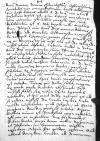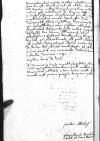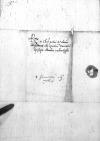Civis Gedanensi[s], qui mihi litteras attulit Reverendissimae Dominationis Vestrae, non aliud postulare visus est quam litteras moratorias. Quae quoniam pluribus concessae iam sunt, deliberatum est sacrae ⌊maiestati regiae⌋ nulli amplius dare. Itaque cum reverendus dominus commendatitias se datur[u]m ad senatum Gedanensem recepisset, de re[l]iquo litterarum genere spem praecidisset, ex eo tempore visus mihi non est.
De ⌊Alexandro⌋ nihil plane adfertur. Ceterum mittit in ⌊Urbem⌋ ⌊reverendissimus dominus⌋ amanuensem suum ⌊Thomam Conopniczki⌋. Is proficiscitur statim a festis Natalitiis, dies plus minus quindecim ⌊Cracoviae⌋ commorabitur. Si quid volet mittere litterarum Reverendissima Dominatio Vestra, modo ⌊Cracoviae⌋ tempori ei dentur, perferet fideliter.
Ex ⌊Hungaria⌋ pridem nihil allatum est. Habita sunt ibi comitia, sed non convenit inter proceres. Spes tamen pacificationis est iniecta. ⌊Turcae⌋, qui ⌊Budae⌋ sunt, magna ex parte peste dicuntur absumpti. Sed misisse fertur sex milia ⌊caesar⌋ exercitus recentis et, qui erant ⌊Budae⌋ reliqui, eos ad se redire iussisse.
De ⌊Carolo⌋ caesare laeta multa nuntiantur: quod ⌊Algero⌋ et ⌊Syria⌋ praeterea dimidia parte sit potitus.
⌊Regem Galliae⌋ rumor est ⌊pontificis⌋ opera reductum esse cum eo in gratiam. ⌊Rex Ferdinandus⌋ habere dicitur prope decem milia ⌊Hispanorum⌋ et ⌊Italorum⌋, ac ⌊Germanorum⌋ auxilia expectare. Atque haec quidem externa.
Quod attinet domestica. Comitia ad Dominicam reminiscere sunt reiecta, quibus interfuturos [nos] spes non est. Quod si vel ad alteram hiem[em] ad ⌊regnum⌋ redire licuerit, praeclare nobis[cum] actum esse putabimus. Dominus Sapia adhuc es[t] in castro superiori. Supplicarunt pro illo ⌊reg[em]⌋ consiliarii fere omnes. Venit huc dominus Tanczinscki, filius castellani Voynicensis, qui necessitudine eum q[u]adam attingit. Supplicavit diligenter, sed rebus infectis discessit. Hoc tamen obtinuerat, ut si fideiussores haberet, dimitteretur. Neque desunt, qui fideiubeant, sed quid futur[um] sit, postea cognoscemus.
Deum precor, ut [Reverendissimam] Dominationem Vestram diu servet incolumem et felic[em]. Cuius gratiae me commendo.


